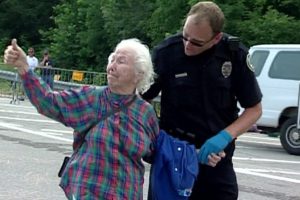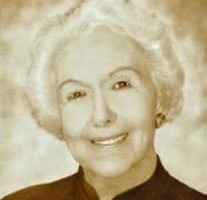Preserving Her Legacy: The Life and Music of Judy Strubhar Ross (1922 – 2022)

Photo from WBIR 10News in Knoxville
One of the great joys of my professional life is meeting and working with outstanding composers. Many of these friends have produced an impressive oeuvre of hundreds and sometimes thousands of compositions spanning multiple genres, but for some, their music remains relatively unknown because of a lack of a publisher. The reasons for this can be complex, but the results are unfortunately the same; after a lifetime of creativity, once the composers have passed, these profound and beautiful compositions are often forgotten. My goal is to change that narrative and I want to encourage others to do the same. It is in that vein that I introduce you to Judy Ross.
Dorothy June “Judy” Strubhar Ross led a fascinating life as a composer, teacher, and activist. An alumna of Interlochen, she graduated from Eastman School of Music (1944) with a degree in composition and settled in Miami, Florida to be near her family. For 45 years she immersed herself in the musical fabric of the city, serving as a script writer at radio station WQAM, music director of the CBS radio affiliate WGBS, librarian and arranger for the Greater Miami Philharmonic Society, music critic for The Week magazine, and was a faculty member for 20 years first at Miami Conservatory of Music and then another 20 years at Miami-Dade Community College. She wrote orchestral works, chamber music, instrumental solos, choral music, and songs.
Her work as an activist was even more impressive. For many years, Judy was deeply involved in teaching and working with the blind and visually impaired, learning both literary and music braille to teach her students and make music available to others. She shared, “this was a joyous experience, working with gifted and responsive people.” But even more powerful, throughout her life she was a passionate advocate for peace, justice, and mercy. A member of the Oak Ridge Environmental Peace Alliance (OREPA), she had been arrested multiple times while protesting nuclear weapons manufacturing and proliferation at the Y-12 plant at the Oak Ridge National Labs. In August of 2002, following her third arrest, the Judge, Donald Layton, told Judy that if she ever appeared before him again, she would be sent to prison. That “next time” occurred on April 9, 2003 after protesting again at the Y-12 plant. When she appeared in court, the Judge told Judy, “ This is a battle of wills. It’s your will against mine, and mine is going to prevail.” She was sentenced to 30 days in jail with 28 days suspended, and was fined $289.50. Her response to his ruling was this statement, “I simply believe, Your Honor, that we were put on this earth to help and care for each other—not to use our talents and energy to devise and build devastating weapons to kill each other . . .” She served two days in jail, not holding incarceration against the judge, and shared with a reporter, “I wasn’t a bit scared. I had a good time. I’m not sure I would have if the sentence was extended, but I could adjust to it. I’m pretty good at adjusting.” She was 82.
I met Judy in Knoxville, Tennessee in 1993. She had relocated to TN following the devastating category 5 hurricane, Andrew, that struck South Florida on August 24, 1992. Judy lost everything in her home but all of her music survived! A proud member of the international music fraternity Sigma Alpha Iota, Judy and I met at a meeting of the Knoxville alumni chapter. Soon after that chance encounter, I received a package of scores in the mail with an invitation to join Judy for a reading session. That afternoon was magical. Judy’s music was captivating! A tonal composer, she carefully crafted songs in a neo-classical style filled with luscious harmonies and beautiful melodies that brought out the many layered meanings of the texts, some she chose, and others she wrote. We knew we had a special connection and began performing together throughout east Tennessee, our partnership lasting for almost 10 years until she moved to North Carolina and I took a job in Georgia.

One of our first performances together was of her song, “Prisoner’s Prayer.” She wrote the poem in 1994 for Amnesty International and later set it as an art song; we premiered it at a Bosnian Benefit dinner later that year. Performances sponsored by the National Federation of American Pen Women, Sigma Alpha Iota, and local music clubs allowed us to share Judy’s profound and powerful music. I so admired her that in 2004 I commissioned a song cycle, allowing her complete control over poetry, only asking that she write a cycle no longer than 20 minutes. She confided that mine was the first ever paid commission she had received! With Judy in NC and me in GA, we sent messages through email and I received sketches of the score through the mail. That summer I drove to her home in the beautiful mountains of NC and we spent three days workshopping the cycle. I received the complete score that fall and, with my friend and colleague Richard Mercer, premiered the cycle on a recital with Judy in attendance. It was wonderful to see her so happy, and for her to be recognized for her talents.
And now we get to the heart of the matter. Judy passed away just a few weeks after her 100th birthday, and I will soon become custodian of her boxes and boxes of music. Except for the song cycle I commissioned, all of her scores are manuscript, written by hand, in pencil. For years I performed from photo copies she gave me. Now I am committed to digitizing her songs and sharing them with others. In 2012 I paid for my commission, My Soul Cries Out: A Cycle of Reflective Songs, to be professional engraved. That was an exciting time with Judy making edits, me singing through all changes, and both the engraver and I carefully deciphering her notes.
I’m now actively searching for partners who will faithfully engrave the rest of her vocal music, creating electronic files, so others can perform her songs. I recently came across the card Judy sent to me following the premiere of the cycle. She wrote, “how can I say how much your faith in my music has meant to me?” How many of you are performing music by composers you cherish, but whose scores are not preserved? What can you do to ensure that others can hear and perform their music? For me, this mission started in 1994 when I began singing Judy’s songs, and has continued as I strive to preserve her music, her passion, her legacy.
